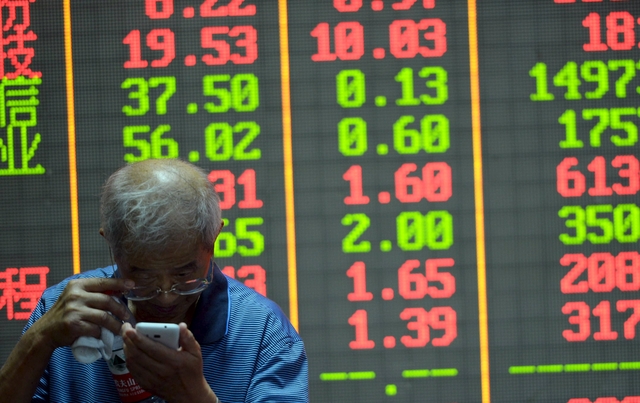The U.S. dollar lunged higher on Tuesday as China allowed its yuan to fall to three-year lows, a shift that heightened unease about the world's second-largest economy even as it promised a much-needed boost to exports.
Asian stocks slipped and sovereign bonds rallied as investors weighed the implications of the surprise move, which seemed to end months of officially sanctioned yuan strength.
China's central bank described the move as a "one-off depreciation" of nearly 2 percent, and said it was based on a new way of managing the exchange rate that better reflected market forces.
Investors reacted by selling the Australian dollar, often used as a liquid surrogate for the Chinese currency. The Aussie sank to $0.7325, from $0.7430 ahead of the news.
Other currencies in Asia also lost ground to the U.S. dollar as investors reasoned they would need to fall to keep exports competitive with China.
Singapore's dollar hit a five-year low, while the Malaysian ringgit and Indonesian rupiah trod ground last visited in the Asian financial crisis 17 years ago.
"As this event has boosted the U.S. dollar and dampened local currencies, it is likely to be welcomed by regional central banks," said Annette Beacher, chief Asia-Pacific macro strategist at TD Securities.
"Any policies that boost the outlook for Chinese growth are positive for the growth outlook more broadly."
Against a basket of currencies, the U.S. dollar gained 0.4 percent to 97.524. The euro eased to $1.0971, while the dollar firmed to 124.75 yen.
Chinese share markets were choppy on the news and eventually turned lower. The CSI300 index was down 0.3 percent, while Shanghai stocks slipped 0.2 percent after scoring hefty gains on Monday.
MSCI's broadest index of Asia-Pacific shares outside Japan lost its early gains to be down 0.7 percent. Japan's Nikkei slipped 0.6 percent.
Sovereign bond markets seemed to catch a bid from the bout of market volatility and yields on 10-year U.S. Treasuries dipped 3 basis points to 2.199 percent.
There was even talk that worries over China combined with U.S. dollar strength could argue against a September rate hike from the Federal Reserve.
Sentiment had initially got a lift from a bounce on Wall Street. The Dow ended Monday with gains of 1.39 percent, while the S&P 500 climbed 1.28 percent and the Nasdaq 1.16 percent.
Shares in Google jumped more than 5 percent, adding $25 billion to its market value, after announcing a new holding company called Alphabet which will separate the core web advertising business from newer ventures.
In commodity markets, the shift in Beijing's currency policy could be seen as a negative in the very near term as a lower yuan makes resources more expensive to Chinese buyers.
Three-month copper futures were off 1 percent, and gold retreated to $1,098.80 an ounce.
Oil also eased back from Monday's highs. Brent crude was quoted 27 cents lower at $50.15 a barrel, while U.S. crude eased 29 cents to $44.67.




















































